Things to Do: Pulp Event Roundup for November

To fill up your November calendar, we’ve compiled a comprehensive list of arts-related events, exhibits, and more throughout Washtenaw County. Check out some local cool happenings in music, visual art, theater and dance, and written word and film.
MUSIC
Bill Edwards
November 11
Canterbury House, Ann Arbor
Ann Arbor singer-songwriter and multi-instrumentalist Bill Edwards performs tracks from his new Americana album, Thirteen Stories. Throughout his latest release, Edwards pens sentimental stories from different perspectives, including a hall-of-fame baseball player, a seasoned songwriter, and a nostalgic boater. Read our preview and interview here.
Nervous But Excited
November 11
The Ark, Ann Arbor
Ten years after their sold-out finale at The Ark, the local folk duo of Kate Peterson and Sarah Cleaver reunite for one of their final Nervous But Excited performances. Their repertoire ranges from smart, introspective narratives to the tactfully political while interspersing songs of love and loss.
Olivia Van Goor
November 11
Blue Llama Jazz Club, Ann Arbor
The Milford jazz vocalist is influenced by swing and bebop jazz from the mid-20th century. Van Goor unearths and reshapes gems from the Great American Songbook and other jazz standards in a way that’s beyond replicating what has already been done before. Read our past interview with Van Goor here.
U-M's production of the musical tragedy "Bernarda Alba" mixes period costumes and an abstract set to confront contemporary issues facing women

Fredrico Garcia Lorca wrote The House of Bernarda Alba in 1936, shortly before he was murdered by a nationalist firing squad during the Spanish Civil War. Michael John LaChiusa shortened the title to Bernarda Alba when he set the play to music and added lyrics; he made some changes to the play while keeping the essential story:
Bernarda Alba assumes the role of family head after her husband’s funeral. She orders her five unmarried daughters, ages 20-39, to mourn for eight years, as her mother did before her. It will be as though the house is bricked up; even crying is forbidden. One problem is that three of the sisters are enamored with the handsome Pepe el Romano—the eldest is engaged to him—and jealousy takes center stage. But what exactly can the sisters do under the circumstances? Turns out, some life-altering things.
When the musical tragedy opened at Lincoln Center in New York in 2006, the scenic design was drab, a realistic depiction of this closed and lonely home.
For Linda Goodrich's production of LaChiusa's Bernarda Alba adaptation that's running November 10-13 at the University of Michigan, scenic designer Jungah Han dropped the drab for what Goodrich calls a “wildly inventive” set. The stark red floor is bordered by a black playing area, with a kind of ceiling that descends to oppress the characters. Actors step out of character and onto the rim at times to witness the action or to narrate.
Fox on the Run: U-M Department of Voice's "The Cunning Little Vixen" was a feast for the eyes and ears
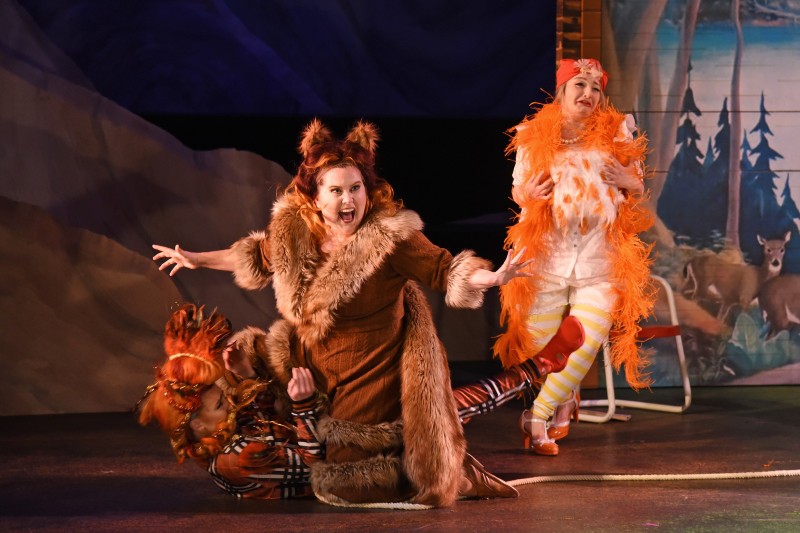
For the weekend of November 3-6, the Power Center at U-M was transformed into a magical, wooded wonderland for the Czech opera The Cunning Little Vixen. The U-M Department of Voice and the University Symphony Orchestra came together to present this whimsical tale composed by Leoš Janáček, with the reduced version arranged by Jonathan Dove.
The original libretto was adapted from the 1920 serialized novella Liška Bystrouška by Rudolf Tésnohlídek and follows the story of a Vixen (female fox) and a Forester. While out in the woods, the Forester falls asleep and when a playful Frog wakes him up, he sees the Little Vixen, traps her, and takes her back to his farm. We move ahead in time and the Little Vixen has grown up, now referred to as simply the Vixen, and is treated as a pet at the Forester’s farm. There is conflict on the farm and she is tied up after defending herself against the Forester’s son and his friend.
Shakespeare's "Much Ado About Nothing" gets a contemporary update with new music at Ann Arbor Civic Theatre

"Therefore play, music."
—Benedick, Much Ado About Nothing
It’s become customary for directors to find ways to make Shakespeare more accessible.
When director David Widmayer proposed the Bard’s Much Ado About Nothing as the play to welcome audiences back to the Ann Arbor Civic Theatre, he embraced Benedick’s call for music.
“My original pitch was to replace the violence in the show with the metaphorical violence of a battle of the bands,” he said.
That proposal was turned down, but music remained a key element for the production, including some cast members creating original compositions for Shakespeare’s verse.
Widmayer has performed in several Shakespeare productions at the Ann Arbor Civic Theatre. This is his second time directing a Shakespeare play.
“I was looking for something that basically we could have fun with and get the audience back into the theater,” Widmayer said.
In Widmayer’s reimagining of Much Ado, musicians and artists go off to war but when they return they lay down their arms to return to the arts. The time is now, but the titles and arrangements of Shakespeare’s world exist in this imaginary version of modern times.
“It’s a place where people can come and perform music and find joy in that art together,” Widmayer said.
Mystery Train: Concordia Theatre takes the audience for a ride on the Orient Express
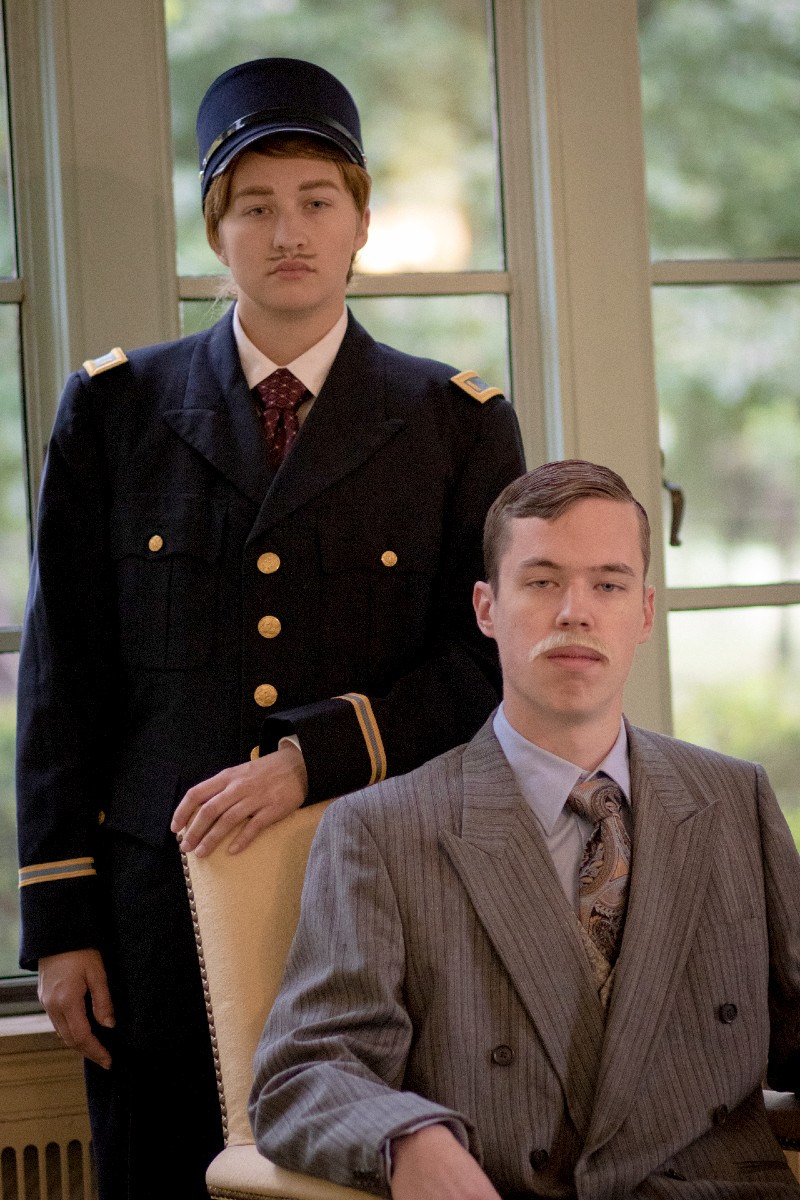
On October 10, the intimate Black Box Theatre at Concordia University was a warehouse full of pianos for a used piano sale. By the end of the month, the 200-seat theater will transport an audience across a winter landscape from Istanbul to central Europe on the legendary Orient Express.
And murder is afoot.
Concordia’s theater department is presenting Ken Ludwig’s stage version of Agatha Christie’s ever-popular Murder on the Orient Express, October 27-30. Hercule Poirot, the eccentric Belgian private detective, will twirl his extravagant mustache and use his gray matter to solve a complex case of murder as the Orient Express makes its way west before being trapped in a blizzard.
It’s a challenging case for Poirot with so many suspects and it’s a challenge for Concordia with the play's unusual setting, numerous European accents, and a large cast of potential murderers.
But Concordia’s theater director Amanda Williams is happy to accept the challenge of presenting a famous mystery and giving a tip of the hat to the woman who transformed the mystery genre, Agatha Christie.
"Mummy" Issues: The Penny Seats Theatre Company's world premiere of "The Mummy Queen" wraps Ann Arbor in a spooky London tale
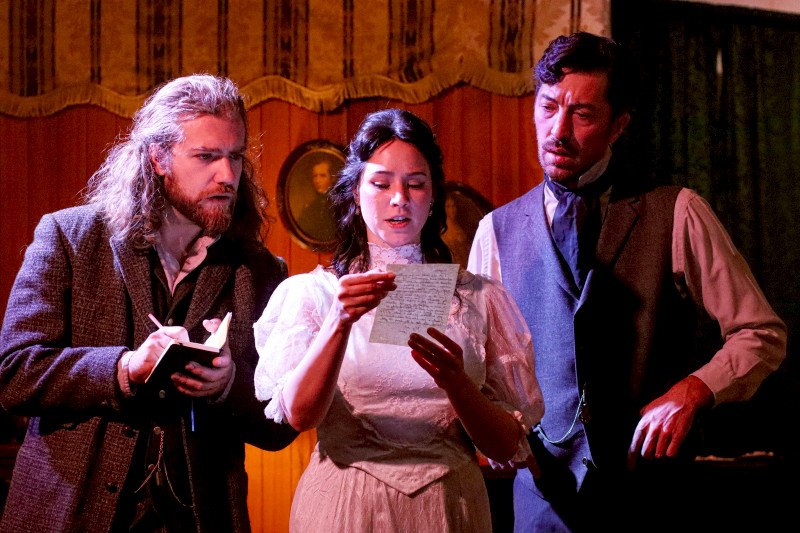
There is a long list of plays and musicals that deal with monsters such as vampires, witches, and Frankenstein. Mummies, however, are scarcely represented on stage.
Michael Alan Herman's The Mummy Queen fills that void, and its world premiere run this month by The Penny Seats Theatre Company is quick, witty, and filled with great storytelling. It's perfect for the Halloween season, but it also tackles the ever-present issue of gender roles, and what (or who) men feel entitled to.
Set in Notting Hill, London, during the 1890s, the show opens with a lengthy monologue from Abel Trelawny—played by the captivating Matthew Cameron—an Egyptologist who has gone on a mission to find the long-lost resting place of Queen Tara. Trelawny tells the epic tale of how he found the queen, brought her back to London, and now has her coffin sitting in his study. While the speech is long, and all told from a past-tense narrative, Cameron does a wonderful job of keeping the audience engaged and wanting more. At the end of his diatribe, he goes to open the coffin and is attacked by an invisible force. He runs off stage, and now we are caught up to speed and in the present day.
Jeff Daniels' “Pickleball” serves up intense characters and a faulty narrative

When I was 8, I performed at a dance recital with my tap classmates. As the girls around me on stage made a few mistakes, I glared at them (according to my amused parents), furious that they were ruining my moment.
This oft-repeated family story came back to me while watching Jeff Daniels’ Pickleball, now having its world premiere at The Purple Rose Theatre Company in Chelsea.
Why?
Because the five absurdly intense, competitive adult characters in the play ultimately seemed like variations of my 8-year-old self, which is a bit problematic. But we’ll get to that shortly.
"North Country" Fare: The 40th-anniversary edition of Jay Stielstra's folk opera sails into The Ark
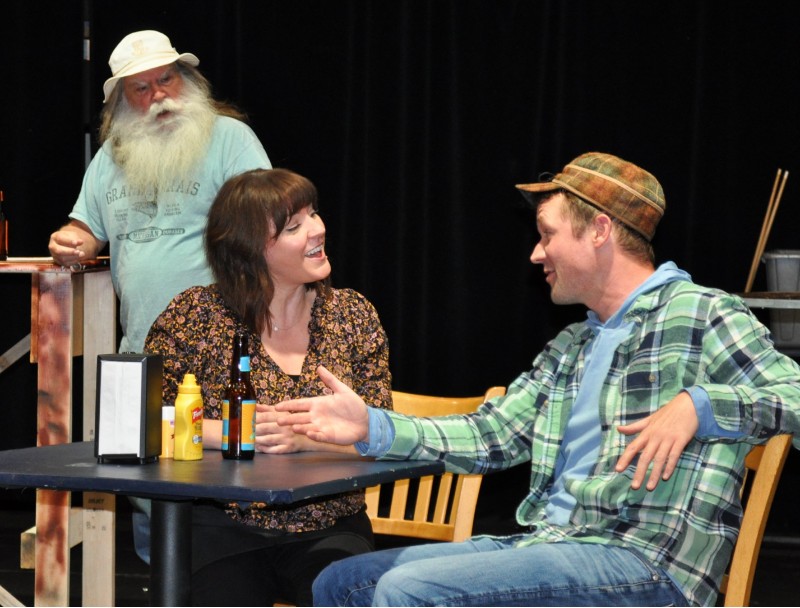
Forty years ago, Jay Stielstra was playing his songs to enthusiastic listeners around Ann Arbor, mostly at Mr. Flood’s Party, a bar that once stood on 120 West Liberty. Bouyed by the response to his tunes, the folk singer decided to write some continuity and put them together in a play, North Country Opera.
“The main thing that carries it are the songs,” Stielstra says. “I asked other musicians I knew in Ann Arbor if they wanted to be in a play, and they all said yes.”
Stielstra knew one of the founders of the Performance Network, the late David Bernstein, and brought the work to him. “David was very enthusiastic,” Stielstra says, and North Country Opera premiered in 1982 as the fledgling theater's second production.
The play was revived in 1992, 1993, and 2003 in Ann Arbor, and in 2022 it toured Northern Michigan, with the 89-year-old playwright along for the ride. North Country Opera returns to Ann Arbor for one night, October 18, at The Ark.
U-M Department of Musical Theatre's "Sophisticated Ladies" is jumping with talent
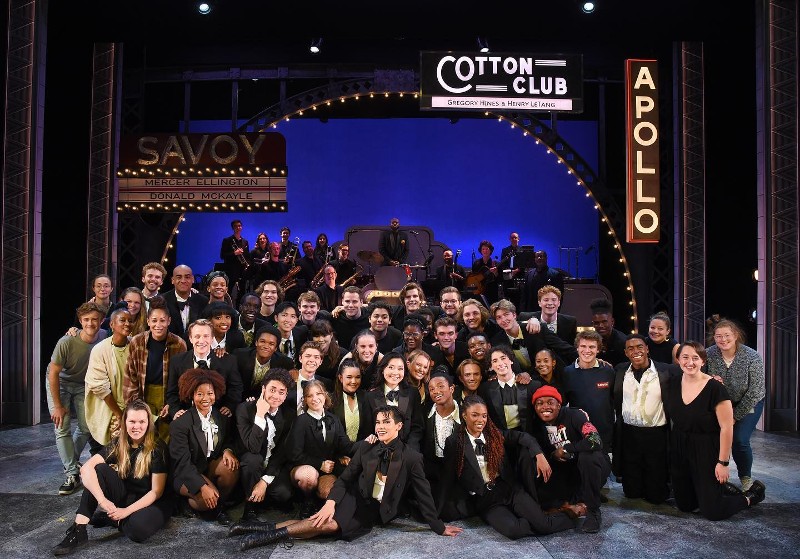
It don’t mean a thing if it ain’t got that swing!
And, man, is it swinging at the Lydia Mendelssohn Theatre during the University of Michigan Department of Musical Theatre's sizzling production of Sophisticated Ladies. The musical revue is a tribute to Edward Kennedy “Duke” Ellington's ever-enduring music and the modern dance styles that it inspired.
Guest directors/choreographers Torya Beard and Ayodele Casel are dancers who realize the immense talent of U-M’s students and provided these future stars with the support and freedom they needed to excel. They also brought in dancer Mercedes Ellington to talk about her art form and to discuss her grandfather Duke and her father, band leader Mercer Ellington. The result is a production of almost nonstop energy, from the orchestra and the large company of dancers to the varied takes by several singers on Ellington’s beloved songs.
Under the musical direction of Maurice Draughn with Tyler Driskill at the piano, the orchestra is always on stage and performs in top form.
Chekhov's "Three Sisters" gets a risqué update in U-M’s "Moscow Moscow Moscow Moscow Moscow Moscow"
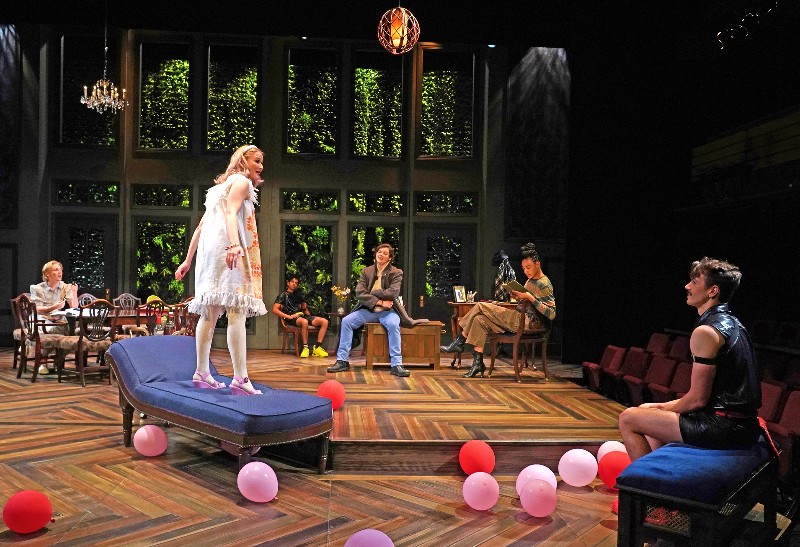
Playwright Halley Feiffer had the clever idea of taking Anton Chekhov’s play Three Sisters and kicking it into the 21st century.
It’s one of those creations that begins with the question, “What if?” What if Chekhov were writing his play today using raw contemporary language with lots of profanity, slang, catchphrases, snarky attitudes, and even a few funny jokes backed by some hot early 2000s music?
The result is Moscow Moscow Moscow Moscow Moscow Moscow being presented at the University of Michigan’s Arthur Miller Theatre. Director Ryan Dobrin takes the idea a bit further in his production at the university by setting Chekhov’s characters “in a more diverse context,” according to a program note. The result is a comic mashup that draws, again according to the program notes, on the affectations of Paris Hilton and the Kardashians as well as on gender-identity issues.
The playbill also comes with a warning that the play may be “upsetting, offensive, or triggering for some audience members” and advises caution. Some of those who might respond that way are fans of Chekhov who might not appreciate what Feiffer has done to his play.


































